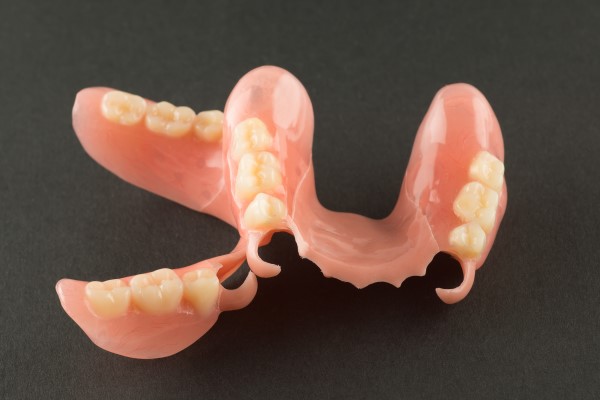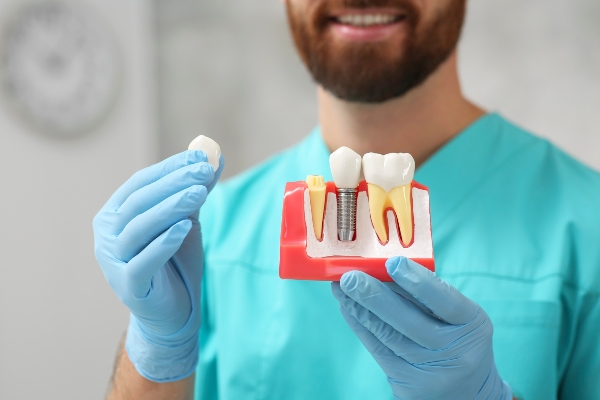Bone Height Required for Implant Supported Dentures?

For those who have lost all or most of their teeth, implant supported dentures are the best solution for lifelike, effective teeth replacement. Not only do implant supported dentures feel, look and work better than traditional dentures, but they can also preserve the jawbone underneath, a quality not shared by regular dentures.
What are implant supported dentures?
Although dental implants are better known for single tooth replacement, these screw-like, titanium posts are actually used for a variety of teeth replacement methods. From single crowns to a full row of prosthetic teeth, dental implants are an excellent option for edentulous patients (those lacking teeth).
Unlike regular dentures that simply stay in place thanks to the gums and mouth muscles, implant supported dentures gain support from implants that are surgically placed into the jawbone. After tooth loss occurs, the jawbone can begin to shrink away if not utilized frequently. Regular dentures sit above the jaw, while implant supported dentures are attached directly to implants that act as artificial tooth roots, keeping the jaw in action.
Since implant supported dentures work by attaching to these strategically placed posts, this means there must be enough bone structure in order to hold the implants in place. The success of an implant relies on the amount of healthy bone tissue available at the implant site.
After an implant is surgically placed into the jaw, a process where the bone fuses with the implant post (osseointegration) commences. It takes about six to nine months to complete, at which point the implant has been accepted into the jaw and become a permanent fixture of the mouth. Implants are made from titanium, a unique metal that can fuse with living bone. For this reason, implants that support dentures can last a lifetime.
How much bone is required?
Generally, a minimum of 1mm of bone is needed around a dental implant. When the implant is next to a tooth or another implant, more space is usually required (2mm to 3mm).
To put it simply, there should be enough bone that the implant will be completely submerged in the jaw, while still having enough space at the bottom of the bone so the implant does not interfere with other vital structures, such as the nerve at the base of the jaw or up in the sinuses.
What if I do not have enough bone?
If there is not enough bone available, bone grafting is a viable option for building healthy bone before implant placement. Grafting consists of taking tissue from living bone elsewhere in the body, from a donor or from animal bone or using synthetic bone to enhance the bone volume in a certain area of the jaw. Bone grafting will take an extra six to nine months to complete before implants can be placed.
Furthermore, when placing implants in the upper jaw, there must be sufficient room vertically. If this is not the case, a sinus lift may be required to rebuild bone in the area before successful implant surgery.
Wondering if you are a good candidate for implant supported dentures?
Give our office a call, and one of our dentists, hygienists or oral surgeons will be able to help determine if you are a good candidate for implant supported dentures. Making the switch from regular dentures? Schedule an appointment today to get enhanced chewing function and a more reliable bite with implant supported dentures.
Request an appointment here: https://www.providencefamilydentistry.com or call Providence Family Dentistry at (678) 496-7021 for an appointment in our Mableton office.
Check out what others are saying about our services on Yelp: Read our Yelp reviews.
Recent Posts
There are many benefits to removable partial dentures instead of alternative treatment solutions (i.e., implant-supported bridges). Understanding the advantages of partial dentures can help you make the most informed choice possible about the best way to replace your missing teeth. Removable partial dentures are a form of teeth replacement for a section of missing teeth. They…
A tooth replacement procedure is necessary when someone has lost their natural teeth. Teeth play an important role in maintaining good health and oral functions like chewing and speaking, so tooth loss can be quite devastating. Fortunately, there are many tooth replacement options available today to replace missing teeth.Options available for those who have missing…
A dental inlay is often necessary for teeth that are in bad shape, whether it be due to cavities or accidental injuries such as cracks or chips. However, among dental restorations, inlays are not the most common type. Most people are familiar with dental fillings or crowns, but general dentists also recommend dental inlays for…
Are you thinking about getting dental sealants? While this preventive dental treatment is commonly used on children's teeth to prevent the formation of cavities, it can also protect adults' teeth. According to WebMD, dental sealant is a thin plastic coating painted on the chewing surfaces of teeth, usually the back teeth, to prevent tooth decay.Understanding…


